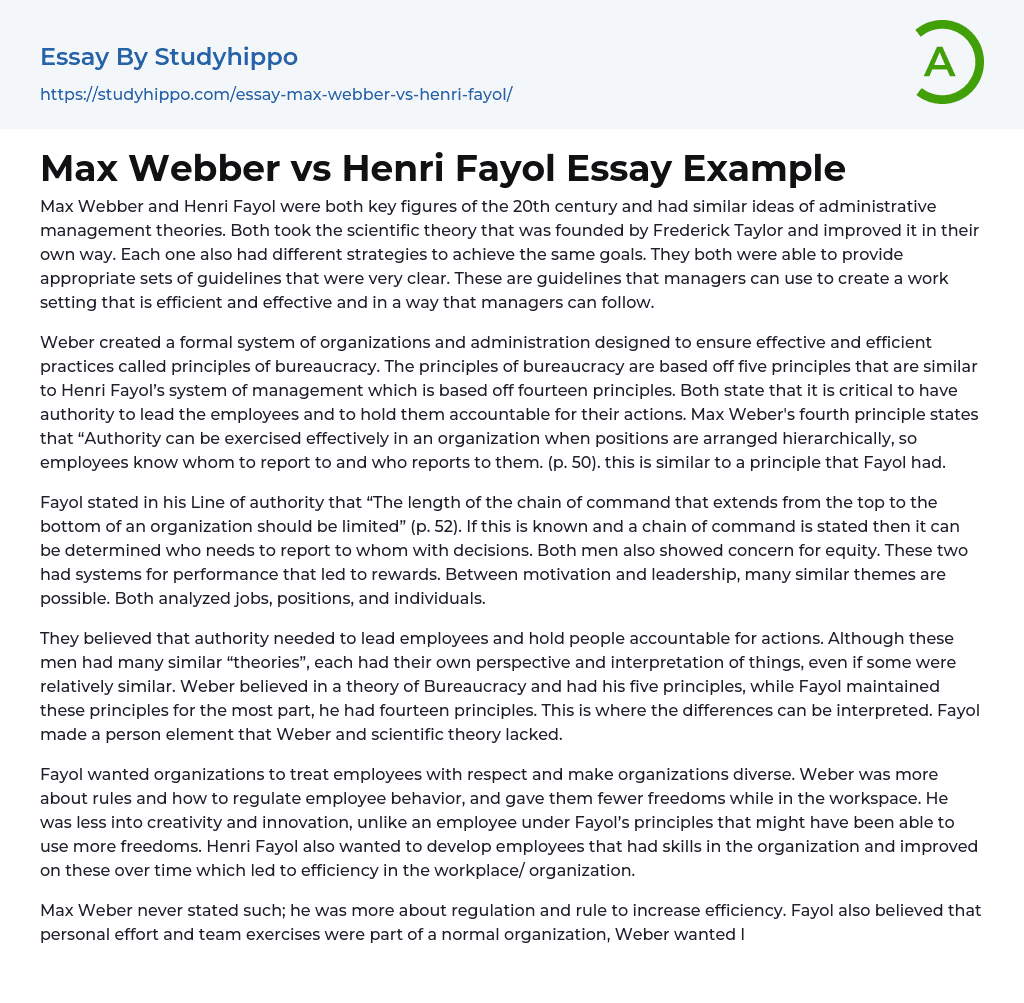Max Webber and Henri Fayol were both key figures of the 20th century and had similar ideas of administrative management theories. Both took the scientific theory that was founded by Frederick Taylor and improved it in their own way. Each one also had different strategies to achieve the same goals. They both were able to provide appropriate sets of guidelines that were very clear. These are guidelines that managers can use to create a work setting that is efficient and effective and in a way that managers can follow.
Weber created a formal system of organizations and administration designed to ensure effective and efficient practices called principles of bureaucracy. The principles of bureaucracy are based off five principles that are similar to Henri Fayol’s system of management which
...is based off fourteen principles. Both state that it is critical to have authority to lead the employees and to hold them accountable for their actions. Max Weber's fourth principle states that “Authority can be exercised effectively in an organization when positions are arranged hierarchically, so employees know whom to report to and who reports to them. (p. 50). this is similar to a principle that Fayol had.
Fayol stated in his Line of authority that “The length of the chain of command that extends from the top to the bottom of an organization should be limited” (p. 52). If this is known and a chain of command is stated then it can be determined who needs to report to whom with decisions. Both men also showed concern for equity. These two had systems for performance that led to rewards. Between motivation an
leadership, many similar themes are possible. Both analyzed jobs, positions, and individuals.
They believed that authority needed to lead employees and hold people accountable for actions. Although these men had many similar “theories”, each had their own perspective and interpretation of things, even if some were relatively similar. Weber believed in a theory of Bureaucracy and had his five principles, while Fayol maintained these principles for the most part, he had fourteen principles. This is where the differences can be interpreted. Fayol made a person element that Weber and scientific theory lacked.
Fayol wanted organizations to treat employees with respect and make organizations diverse. Weber was more about rules and how to regulate employee behavior, and gave them fewer freedoms while in the workspace. He was less into creativity and innovation, unlike an employee under Fayol’s principles that might have been able to use more freedoms. Henri Fayol also wanted to develop employees that had skills in the organization and improved on these over time which led to efficiency in the workplace/ organization.
Max Weber never stated such; he was more about regulation and rule to increase efficiency. Fayol also believed that personal effort and team exercises were part of a normal organization, Weber wanted less interaction between workers. Both men have shaped Bureaucracy and administration and showed many similar characteristics that have been demonstrated. They also had differences. Businesses today still follow bits and pieces of each man’s organizational principles and this will continue for years to come.
- Auction essays
- Balanced Scorecard essays
- Business Plans essays
- Expense essays
- Income essays
- Net Income essays
- Security Guard essays
- Singapore Airlines essays
- Battle essays
- Intranet essays
- Maintenance essays
- Simulation essays
- Inn essays
- Qualities essays
- Business Law essays
- Contract essays
- Consumer Protection essays
- Property essays
- Ownership essays
- Agreement essays
- Common Law essays
- Contract Law essays
- Justice essays
- Security essays
- Tort Law essays
- United States Constitution essays
- Crime essays
- Lawsuit essays
- Treaty essays
- Family Law essays
- Marijuana Legalization essays
- Constitution essays
- War on Drugs essays
- Court essays
- Jury essays
- Police essays
- Protection essays
- Community Policing essays
- Criminal Law essays
- Judge essays
- Lawyer essays
- Employment Law essays
- Copyright Infringement essays
- Injustice essays
- Intellectual Property essays
- Breach Of Contract essays
- Jurisprudence essays
- Social Injustice essays
- Juvenile Justice essays
- Internet Privacy essays




